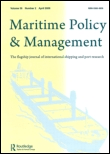
Maritime Policy & Management
Scope & Guideline
Advancing Knowledge for a Sustainable Ocean
Introduction
Aims and Scopes
- Maritime Transportation Economics:
Research in this area examines the economic aspects of maritime transport, including freight rates, shipping market dynamics, and cost analyses related to shipping operations. - Sustainability and Environmental Impact:
This scope focuses on the environmental implications of maritime operations, exploring green shipping practices, emissions reduction strategies, and sustainable port management. - Technological Innovations in Shipping:
The journal emphasizes the role of technology in maritime operations, including digitalization, automation, and the application of blockchain and IoT in shipping and port management. - Policy and Regulatory Frameworks:
Research often delves into the policy implications affecting the maritime industry, including governance, regulations, and the impact of international agreements on shipping practices. - Safety and Risk Management:
This area examines safety protocols, risk assessment methodologies, and strategies to enhance safety in maritime operations, addressing human factors and organizational behavior. - Port Management and Operations:
The journal covers studies on port efficiency, management practices, and the operational challenges faced by ports in a globalized shipping environment. - Maritime Logistics and Supply Chain Management:
Research in this scope focuses on the logistics of maritime transportation, including intermodal transport, supply chain optimization, and the integration of ports into broader logistics networks.
Trending and Emerging
- Integration of Smart Technologies in Ports:
The adoption of smart technologies, including AI, IoT, and digital twins, is gaining traction, highlighting the importance of technological advancements in enhancing port efficiency and operations. - Climate Change and Resilience Strategies:
Research focusing on climate change impacts and resilience strategies in maritime operations is on the rise, emphasizing the need for adaptive measures in the face of environmental challenges. - Decarbonization and Green Shipping Initiatives:
There is an increasing focus on decarbonization efforts within the shipping industry, including studies on the implementation of alternative fuels, emissions reduction strategies, and sustainable shipping practices. - Maritime Cybersecurity:
As digitalization increases, so does the relevance of cybersecurity in maritime operations, with emerging research addressing vulnerabilities and protective measures against cyber threats. - Supply Chain Disruptions and Recovery Post-COVID-19:
The pandemic has spurred research into supply chain vulnerabilities and recovery strategies, with a focus on resilience and adaptability in maritime logistics. - Data Analytics and Predictive Modeling:
The use of big data analytics and predictive modeling techniques in maritime research is trending, enabling better decision-making and operational efficiencies in shipping and port management.
Declining or Waning
- Traditional Shipping Models:
There has been a noticeable decrease in research centered around traditional shipping models, as scholars increasingly explore more dynamic and integrated approaches to maritime logistics and operations. - Maritime Labor Issues:
Research focused on labor-related issues in the maritime sector, such as seafarer welfare and employment conditions, has seen a decline, possibly due to prior extensive coverage of these topics. - Historical Analyses of Maritime Practices:
The focus on historical analyses of maritime practices has waned, with researchers shifting towards contemporary issues and future-oriented studies that address current challenges in the maritime industry.
Similar Journals

Maritime Business Review
Connecting Scholars in Maritime Business ExcellenceMaritime Business Review, published by Emerald Group Publishing Ltd, is a leading academic journal dedicated to advancing knowledge in the fields of maritime business, transportation, and management. With an ISSN of 2397-3757 and E-ISSN of 2397-3765, this journal has established itself as a vital resource for researchers and practitioners alike, particularly noted for its contribution to the domains of Business and International Management, Management of Technology and Innovation, Strategy and Management, and Transportation. The journal is ranked in the prestigious Q2 quartile in each of these categories as of 2023, reflecting its impactful research and relevance in contemporary academic discourse. Although currently not an Open Access journal, it offers robust access options through institutional subscriptions—making its rich repository of cutting-edge research readily available to scholars and professionals. Since its inception in 2016 and continuance to 2024, Maritime Business Review has emerged as an essential platform for both emerging and established academics to share innovative insights and enhance collaborative efforts within the international maritime business community.

International Journal of Maritime Engineering
Navigating the Future of Maritime InnovationThe International Journal of Maritime Engineering (ISSN: 1479-8751, E-ISSN: 1740-0716), published by UNIV BUCKINGHAM PRESS in the United Kingdom, is a vital resource for the maritime engineering community, addressing pressing issues in both Environmental Engineering and Ocean Engineering. Established in 2006, this journal serves as a platform for disseminating innovative research, technological advancements, and practical solutions that enhance the sustainability and efficiency of maritime operations. With its current classification in the Q3 quartile for both fields in 2023, it offers valuable insights to researchers, professionals, and students who seek to bridge theoretical knowledge with industry applications. Though the journal does not operate under an open access model, it remains an essential reference for academic discourse and advancement in maritime studies through its rigorous peer-review process and high-level research outputs.
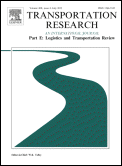
TRANSPORTATION RESEARCH PART E-LOGISTICS AND TRANSPORTATION REVIEW
Driving Efficiency in Transportation Systems and LogisticsTRANSPORTATION RESEARCH PART E-LOGISTICS AND TRANSPORTATION REVIEW, published by PERGAMON-ELSEVIER SCIENCE LTD in the United Kingdom, is a leading academic journal that focuses on the complementary fields of logistics and transportation. Since its inception in 1997, this journal has been instrumental in shaping the discourse around various facets of transportation systems, supply chain optimization, and logistical efficiency. With an impressive 2023 impact factor and a prestigious ranking, classified as Q1 in key categories such as Business and International Management, Civil and Structural Engineering, and Management Science and Operations Research, it stands at the forefront of research in its domain. The journal is committed to disseminating high-quality research and offers open access options to enhance the visibility and impact of its articles. As it converges its content through 2024, it continues to provide invaluable insights to a diverse audience of researchers, practitioners, and students who are keen on advancing knowledge and practices in transportation and logistics.

Maritime Transport Research
Pioneering Insights into the Dynamics of Maritime TransportMaritime Transport Research is a cutting-edge journal dedicated to advancing knowledge and innovation within the field of maritime transport. Published by ELSEVIER, this Open Access journal has been active since 2020, providing researchers, professionals, and students with free and unrestricted access to high-quality research content. With an impressive impact factor and categorized in the Q2 quartile for the field of Transportation, this journal ranks #50 out of 141 in Scopus' Social Sciences _ Transportation category, placing it in the 64th percentile among its peers. Maritime Transport Research aims to foster interdisciplinary dialogue and promote scholarly advancements by publishing original research, reviews, and case studies that address the complexities and dynamics of maritime logistics, policy, and technology. Located in the United Kingdom, this journal is a vital resource for anyone engaged in maritime studies, highlighting its commitment to supporting the academic community through rigorous and impactful research.
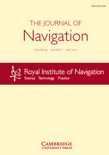
JOURNAL OF NAVIGATION
Advancing Knowledge for Safer SeasJournal of Navigation, published by Cambridge University Press, is a premier academic journal that has served the maritime community since its inception in 1948. With an esteemed ISSN of 0373-4633 and an E-ISSN of 1469-7785, this journal is recognized for its rigorous peer-reviewed research that significantly contributes to the fields of Ocean Engineering and Oceanography. The journal ranks in the Q2 quartile, showcasing its position among the top-tier publications in these domains, with impressive Scopus rankings placing it 24th in Oceanography and 22nd in Ocean Engineering. While currently not an open-access publication, it offers valuable insights and advancements relevant to researchers, professionals, and students, fostering a deeper understanding of navigation in both theoretical and applied contexts. The Journal of Navigation aims to disseminate innovative research that impacts maritime practices and enhances navigational safety and efficiency.
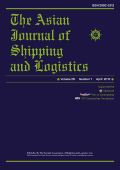
Asian Journal of Shipping and Logistics
Bridging Theory and Practice in Shipping and LogisticsAsian Journal of Shipping and Logistics, published by Elsevier, is a premier Open Access journal dedicated to advancing research in the fields of shipping, logistics, and transportation. Established in 2009, the journal is indexed in Scopus and boasts an impressive 2023 category quartile ranking of Q2 across various related disciplines including Business and International Management, Management of Technology and Innovation, and Transportation. With its mission to explore innovative solutions and contemporary challenges within these dynamic sectors, the Asian Journal of Shipping and Logistics serves as an essential platform for researchers, academics, and practitioners aiming to stay at the forefront of knowledge in logistics operations and economic strategies. The journal's strong emphasis on real-world applications and cutting-edge methodologies makes it indispensable for those interested in enhancing the efficiency and effectiveness of shipping and logistics systems in a global context. For more information, please visit our website and explore our open-access articles, which provide a wealth of research findings accessible to the broader community.
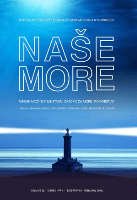
Nase More
Pioneering Research at the Intersection of Science and EngineeringNase More is a prominent open-access journal dedicated to the fields of Ocean Engineering, Process Chemistry and Technology, Water Science and Technology, and Transportation. Published by the University of Dubrovnik, this journal has been disseminating valuable research since its inception in 1994, with a commitment to providing unrestricted access to scholarly work since 2003. The journal boasts a diverse range of submissions that contribute to the advancement of knowledge and innovation within its scope, making it an essential resource for researchers, professionals, and students alike. With a current impact factor reflected in its Category Quartiles as Q4 in Ocean Engineering, Q3 in Process Chemistry and Technology, and Q4 in related fields, Nase More is positioned to meet the evolving needs of its readership. Located in the picturesque city of Dubrovnik, Croatia, this journal not only serves as a platform for rigorous academic inquiry but also fosters collaboration and dialogue among experts in environmental science and engineering disciplines.

Archaeologia Maritima Mediterranea-An International Journal on Underwater Archaeology
Illuminating the Underwater World of the MediterraneanArchaeologia Maritima Mediterranea is a prestigious international journal focused on the vital field of underwater archaeology, published by FABRIZIO SERRA EDITORE. With an ISSN of 1724-6091 and E-ISSN 1825-3881, this journal has been a cornerstone for scholars and enthusiasts alike in the study of maritime cultures, shipwrecks, and submerged sites around the Mediterranean region since its inception. Operating from its base in Pisa, Italy, the journal has a commendable academic presence, reflected in its recent Scopus rankings which place it in the lower quartiles in both Arts and Humanities, and Social Sciences subcategories within archaeology. Despite its current Q4 categorization, it serves as an important platform for emerging research and advancements in the field, aiming to foster collaboration and knowledge exchange amongst researchers, practitioners, and students. While the journal is accessible through traditional subscription models, the lack of open access emphasizes the publisher's commitment to maintaining high academic standards. The collection of issues from 2011 to 2023 showcases a rich tapestry of research that contributes significantly to our understanding of underwater cultural heritage.

Transactions on Maritime Science-ToMS
Connecting Ideas, Shaping Maritime SolutionsTransactions on Maritime Science-ToMS is a distinguished journal published by the FAC MARITIME STUDIES in Croatia, dedicated to the exploration and dissemination of cutting-edge research across multiple disciplines within maritime studies, including Automotive Engineering, Law, Ocean Engineering, Transportation, and Water Science and Technology. Since its inception, this journal has made significant strides in impacting these fields, as evidenced by its recent Scopus ranks and impressive quartile classifications, with recognitions in Q2 and Q3 across various categories. The journal operates on an open-access model, enhancing the visibility and accessibility of important research findings to professionals, researchers, and students alike. In an era where maritime challenges are at the forefront of global discourse, ToMS aims to foster interdisciplinary communication and innovation to address pressing issues in maritime science and engineering. As such, it serves as a vital resource for advancing knowledge and promoting best practices within both academic and applied contexts.

Navigator-Subsidios para a Historia Maritima do Brasil
Illuminating Brazil's Seafaring StoriesNavigating maritime history in Brazil, the journal Navigador-Subsidios para a Historia Maritima do Brasil serves as a pivotal platform for scholars, researchers, and enthusiasts alike. Published by the Ministerio Marinha, Serv Documentacao Geral Marinha, this esteemed journal has been offering Open Access content since 2005, ensuring that valuable insights into Brazil's rich maritime heritage are accessible to a global audience. Featuring a wide range of scholarly articles, the journal addresses various aspects of maritime history, including naval exploration, trade routes, and the cultural impact of seafaring on Brazilian society. By continually contributing to academic discourse, Navigador plays an essential role in preserving and promoting Brazilian maritime heritage, appealing to professionals in history, maritime studies, and cultural research.